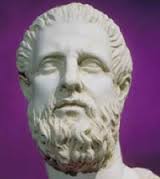Lesson 2 - Historical Perspectives of Abnormal Behaviour
Historical Perspectives
 Hippocrates
Hippocrates
The Greek physician Hippocrates (460-377 B.C.) was one of the first to reject the idea that deities and demons controlled behaviour. He believed that the brain was the main center of intellectual activity and that abnormal behaviour was due to brain pathology. Emotional factors were not considered a cause of body ailments until much later. To his credit, Hippocrates also understood that predisposition, heredity, and trauma could affect behaviour changes. From his clinical work, he made detailed observations of behaviour and classified mental disorders into three main categories: mania, melancholia, and phrentis (brain fever). His treatment of these disorders were kinder and gentler than other treatments of the day.
Melancholia, for example, required that the patient lead a tranquil life: sobriety, abstinence from all excesses, regular exercise, a vegetable diet, celibacy, and bleeding, if needed. Although his treatments were advanced for the day, the lack of physiological knowledge made some of his diagnoses incorrect. He wrongly believed that hysteria (physical illness without a biological cause) could only be contracted by women and was caused by the wandering of the uterus within the body because of its longing for children. His prescription for this malady was for affected women to marry.
Hippocrates also believed in the existence of four bodily fluids or “humours” – blood, black bile, yellow bile, and phlegm. When the fluids were improperly mixed, a physical or mental disorder was the result. While we now know no such fluids relate to our mental health, this was the beginning of understanding how balance in life is important.
|
Click on the link below to learn more... |
Watch the first half of the video below to learn more about Hippocrates. (You can stop the video when they talk about Galen.)